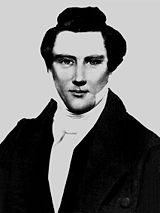Portal:Christianity/Selected biography/September 2007
The early life of Joseph Smith, Jr. covers the period from his birth on December 23, 1805, to the end of 1827, when Latter Day Saints believe Smith located a set of Golden Plates engraved with ancient Christian scriptures, buried in a hill near his home in Manchester, New York.
Joseph Smith, Jr. was the principal founder and leader of the Latter Day Saint movement, which gave rise to Mormonism, and includes such denominations as The Church of Jesus Christ of Latter-day Saints and the Community of Christ. Smith's followers believe he was a latter-day prophet.
This early period of Smith's life is significant within Mormonism because it represents the time when Smith is said to have first acted as a prophet, had a theophany (called by his followers the First Vision), and to have obtained the Golden Plates, the source material for the Book of Mormon, a Latter Day Saint sacred text. During this period, Smith was influenced by numerous religious and cultural trends in early United States history. The nation at the time was undergoing a cultural reaction against the secularism of the Age of Enlightenment, called the Second Great Awakening. In addition, Americans' widespread acceptance of folk religion up until the 1830s and a growing interest in forming separate religious communities created ripe conditions for a young man such as Smith to successfully build a religion based on the appearance of angels and the miraculous translation of ancient records. Latter Day Saints view the events in Smith's early life as evidencing his calling as a prophet and as providing the basis for organizing the Church of Christ.
(more)

